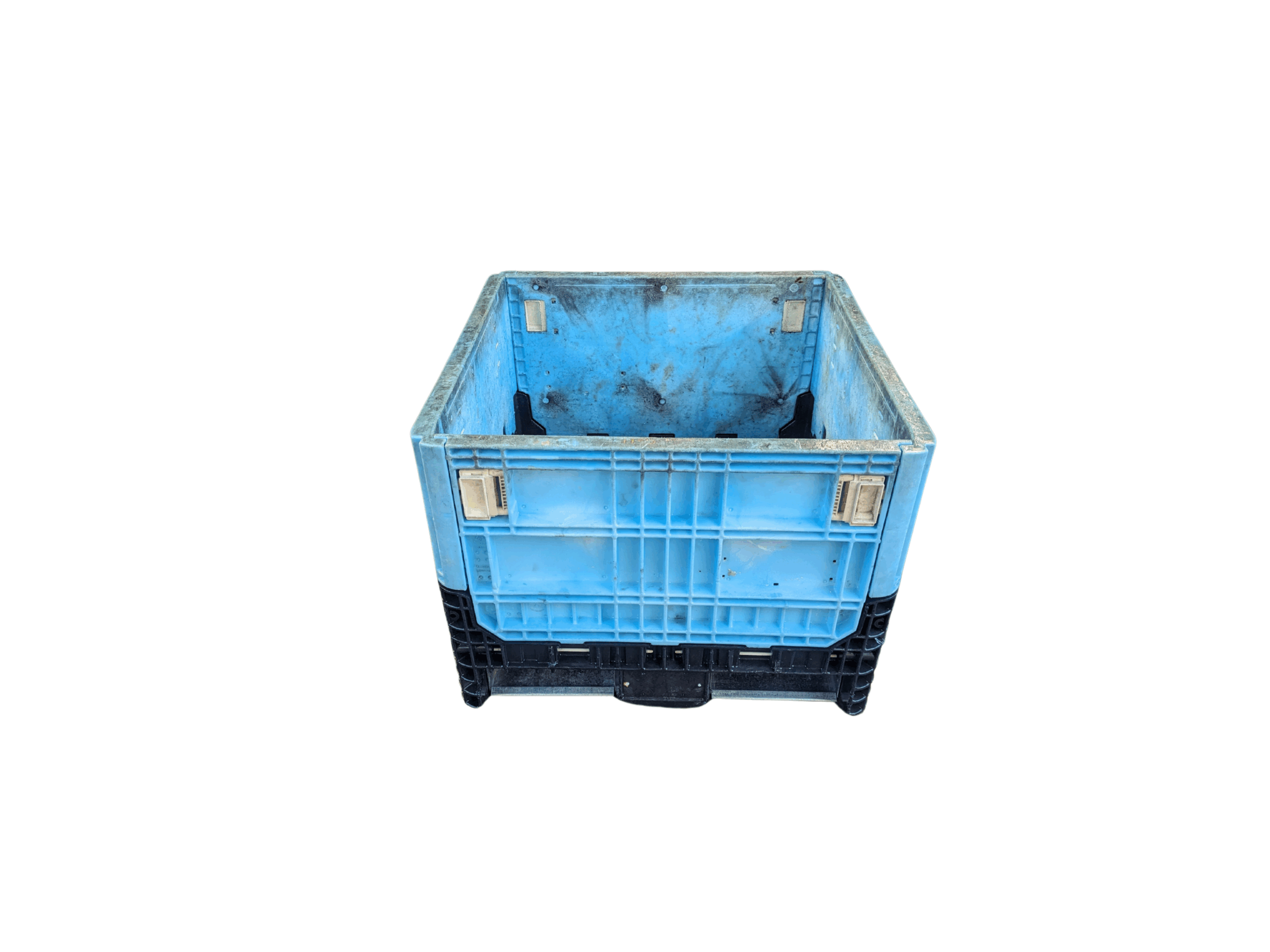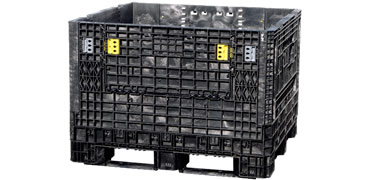Why refurbished bulk containers are smart solutions for sustainable businesses
Wiki Article
Why Mass Containers Are Necessary for Cost-efficient and sustainable Transport
Bulk containers play a crucial role in modern-day logistics. They help with the reliable activity of large amounts of items, thereby enhancing transportation processes. This method not only lowers costs however additionally lessens environmental influence through lower exhausts and waste generation. As sectors look for more lasting techniques, the fostering of bulk containers is coming to be significantly considerable. What ramifications does this shift hold for future logistics and supply chain monitoring?
The Benefits of Making Use Of Bulk Containers in Logistics
Bulk containers revolutionize logistics by boosting performance and sustainability. These containers enable for the transportation of huge quantities of products in a solitary journey, significantly lowering the number of journeys required. This not just enhances procedures however additionally lessens labor costs connected with handling, packing, and discharging. On top of that, mass containers are developed to maximize area application within transport vehicles, ensuring that even more products can be delivered simultaneously.The standardization of mass containers likewise simplifies the logistics process. With uniform measurements, they can be conveniently piled and kept, leading to boosted warehouse monitoring. Furthermore, bulk containers commonly feature sturdy products that secure contents from damages during transit, consequently lowering product loss and raising overall integrity. Because of this, businesses can experience enhanced supply chain performance, inevitably leading to raised success and consumer satisfaction. This mix of elements makes bulk containers a crucial property in contemporary logistics.
Environmental Effect: Minimizing Waste and Carbon Impact
As industries increasingly prioritize sustainability, the fostering of bulk containers has become a key approach for lowering waste and reducing carbon footprints. These containers lessen the use of packaging materials, such as boxes and plastic, therefore especially decreasing overall waste generation. By settling shipments, bulk containers improve transportation performance, permitting for even more products to be delivered per journey. This decrease in journeys directly correlates with reduced greenhouse gas emissions, adding to a smaller carbon footprint.Bulk containers can typically be recycled or reused, further reducing ecological influence. The longevity of these containers assurances they can withstand several transportation cycles, decreasing the requirement for single-use alternatives. used bulk containers. By improving logistics and promoting efficient resource usage, bulk containers not only sustain sustainable techniques however likewise encourage sectors to straighten with global ecological objectives. Inevitably, their application shows a commitment to environmental stewardship and responsible source administration
Cost Financial Savings: Exactly How Bulk Containers Lower Transport Expenses
While numerous business seek ways to enhance their bottom line, using mass containers provides a considerable chance for decreasing transportation expenses. Mass containers make the most of the quantity of items transferred, enabling companies to ship larger amounts simultaneously. This effectiveness minimizes the number of journeys called for, straight reducing fuel prices and minimizing labor expenses connected with loading and unloading.Additionally, mass containers typically include structured styles that enhance area utilization within transport automobiles. This implies less empty areas, bring about a lot more efficient usage of readily available capability. Furthermore, the sturdiness of mass containers can decrease the risk of product damage throughout transportation, minimizing losses and making certain that more items arrive intact.
Enhancing Supply Chain Efficiency With Mass Storage Space Solutions
Mass storage space remedies play a crucial role in boosting supply chain efficiency by optimizing inventory management. By combining products right into less, larger containers, services can greatly lower taking care of costs connected with regular transfers and handling. This structured method enables far better tracking and administration of stock, ultimately leading to boosted operational efficiency.Streamlined Inventory Monitoring
Efficient stock management is important for optimizing supply chain operations, particularly when companies embrace bulk storage remedies. These services allow businesses to keep higher supply levels while lessening the regularity of replenishment. By settling materials into mass containers, business can simplify their inventory processes, decreasing the intricacy related to tracking numerous smaller bundles. This method assists in precise supply matters and boosts projecting accuracy, permitting even more enlightened decision-making. On top of that, mass storage remedies streamline storage facility company, making it much easier to locate and access items when needed. Consequently, companies can attain a more efficient supply turnover price, inevitably improving overall supply chain performance and decreasing the likelihood of stockouts or overstock situations.
Decreased Handling Prices
The execution of mass storage remedies not only simplifies supply administration yet also considerably reduces dealing with prices throughout the supply chain. By settling materials into mass containers, firms decrease the requirement for regular handling and transfer in between various storage space and transport devices. This method minimizes labor expenses related to loading, unloading, and moving smaller packages. Additionally, mass storage space lowers the regularity of shipments, resulting in reduced transport prices and lowered fuel usage. Consequently, businesses can optimize their logistics procedures, permitting for a more effective allowance of resources. Inevitably, reduced taking care of expenses contribute to improved total supply chain performance, promoting a setting that supports both sustainability and economic viability.
Flexibility of Mass Containers Throughout Numerous Industries
Several markets have distinct demands for transportation and storage space, mass containers have arised as a versatile solution that satisfies a vast array of needs. These containers, ranging from huge bins to specialized storage tanks, can fit diverse products, consisting of powders, fluids, and granules. In the farming industry, bulk containers assist in the transport of fertilizers and grains, while the food and beverage market uses them for components and ended up items. The chemical industry counts on mass containers for safely delivering dangerous products, making sure conformity with security regulations. Additionally, building companies take advantage of bulk containers for transporting accumulations and various other products. Their adaptability reaches various modes of transportation, including ships, trains, and trucks, boosting logistical efficiency. This flexibility not only enhances procedures across different sectors yet likewise promotes sustainability by reducing product packaging waste and maximizing room in transportation. Mass containers play a necessary duty in modern supply chain administration.Future Fads in Bulk Container Usage and Sustainability
The future of mass container usage is increasingly shaped by ingenious materials advancement that enhances sustainability. Furthermore, automation in logistics assures to enhance operations, reducing waste and boosting performance. Welcoming circular economy techniques will certainly additionally change how bulk containers are made, used, and reused, fostering an extra lasting transportation landscape.Innovative Products Growth
As sectors increasingly focus on sustainability, innovative materials growth in mass containers becomes a significant consider enhancing green transportation remedies. Researchers and producers are checking out naturally degradable plastics, recycled composites, and lightweight steels to decrease ecological influence. These products not only reduce waste however likewise boost fuel performance by reducing the overall weight of containers. In addition, innovations in smart materials, which can adjust to varying conditions, improve the sturdiness and performance of mass containers. The assimilation of these ingenious materials straightens with circular economy principles, promoting reuse and recycling. As the demand for lasting techniques grows, the advancement of such materials will certainly play an essential function in shaping the future of mass container usage in logistics and transportation.Automation in Logistics
Considerable innovations in automation are poised to change logistics and the application of mass containers, enhancing sustainability in transport. Automated systems, consisting of drones and independent automobiles, are streamlining the motion of mass containers, minimizing the dependence on standard fuel-powered transport. These technologies maximize transmitting and loading procedures, boosting and lessening vacant miles fuel effectiveness. In addition, automated inventory management systems improve tracking and monitoring of bulk containers, making certain far better source allotment and decreased waste. The integration of the Internet of Things (IoT) enables real-time data evaluation, allowing aggressive decision-making that lines up with sustainability goals. As automation remains to develop, it is anticipated to drive additionally developments in bulk container use, inevitably sustaining more lasting logistics practices and lowering the environmental effect of transportation.Round Economy Practices
Developments in automation are setting the phase for a much more integrated strategy to round economic situation practices in the domain of bulk container use. As markets progressively accept sustainability, bulk containers are being created for durability and reusability. This shift not just decreases waste however additionally boosts source effectiveness. Business are embracing strategies such as closed-loop systems, where utilized containers are accumulated, reconditioned, and reestablished into the supply chain. Furthermore, smart technologies track container life cycles, assisting in far better monitoring and lowering environmental influence. The cooperation between suppliers, logistics service providers, and end-users is necessary in establishing criteria for sustainable container use. used collapsible containers. Future patterns suggest an expanding emphasis on materials that are naturally degradable and recyclable, additional enhancing the round economic climate's principles wholesale transportation
Often Asked Concerns
What Materials Are Mass Containers Commonly Made From?
Bulk containers are commonly created from sturdy materials such as high-density polyethylene, cardboard, steel, and aluminum. These products supply flexibility, security, and strength, making them appropriate for carrying different products in different sectors successfully.How Do I Pick the Right Size Mass Container?
Choosing the ideal size bulk container involves examining the volume of products to be delivered, considering handling tools compatibility, and appraising storage area requirements. Proper size warranties performance in transportation and decreases waste throughout delivery.Are Bulk Containers Reusable or Recyclable?
Mass containers are typically recyclable, made for click here several trips, improving sustainability. Many can also be recycled, depending upon the products made use of. Choosing recyclable alternatives even more lowers and supports environmental goals waste in transport practices.What Safety Regulations Relate To Bulk Container Transport?
Security policies for mass container transport include conformity with the Department of Transportation standards, appropriate labeling of unsafe products, structural honesty analyses, and adherence to weight limitations to guarantee risk-free handling and stop accidents throughout transit.Just How Can Companies Change to Making Use Of Mass Containers Efficiently?
Companies can transform to bulk containers by assessing current logistics, educating team on handling, buying ideal devices, enhancing inventory administration, and teaming up with suppliers to guarantee compatibility and performance throughout the supply chain.
As sectors progressively focus on sustainability, the fostering of bulk containers has actually emerged as an essential approach for reducing waste and decreasing carbon footprints. By combining materials into bulk containers, companies can streamline their inventory procedures, decreasing the intricacy connected with tracking several smaller packages. As sectors progressively focus on sustainability, cutting-edge products development in bulk containers emerges as a considerable factor in enhancing eco-friendly transportation options. Automated systems, consisting of drones and autonomous vehicles, are enhancing the activity of mass containers, reducing the reliance on conventional fuel-powered transport. Furthermore, automated supply monitoring systems enhance tracking and monitoring of bulk containers, making certain much better resource allocation and minimized waste.
Report this wiki page